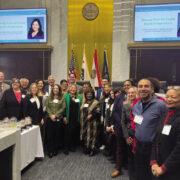THE Church sees the homily as an opportunity to address a “people hungry, sometime desperately so, for meaning in their lives.” The homily attends to feeding that particular hunger. In offering the gathered community a word of meaning, a scriptural interpretation of human existence, it empowers them to be active participants in the Liturgy of the Eucharist and to go forth to live a gospel-influenced life.
The homilist here is a “mediator of meaning,” enabling people to enter more fully into both liturgy and life. The image of the homilist as one who feeds the people is rooted in the 1970 General Instruction of the Roman Missal which speaks of the homily as “a necessary source of nourishment of the Christian life.”
The homilist then keeps in mind the particular needs of the believing community.
The homilist feeds this hunger for “ultimate meaning” by helping the community recognize God’s presence and action in its midst, especially in the routine and random events of life. The focus of the homily, then, is the ongoing human existence of the community existing in a particular time and place.
The homilist also addresses the hunger for wholeness, that yearning at our deepest level for being complete, fulfilled, “perfect” as Jesus calls his disciples to be. This takes place on the great feasts of our Lord, especially those pivotal events in the life of Jesus: his birth, epiphany, death, resurrection, ascension, and sending of the Holy Spirit and those feasts that celebrate central doctrinal beliefs such as Trinity Sunday, the Body and Blood of Christ, and Christ the King, and how such preaching can nourish this particular hunger for wholeness.
Homilies are opportunities to address our hunger to belong, a hunger that often brings us individually to church, to come into contact with a larger community, to be connected with others on the level of shared faith, and to live more full in a deeper awareness of our communion with all who have gone before us, Mary and the Saints. Homilies allow the preacher to bring these friends and prophets of God into deeper contact with us who continue to struggle to grow in Christ.
The Constitution on the Sacred Liturgy calls homilies as integral to the liturgy. To stress their importance, the document specified that preachers may not omit homilies on Sundays and holy days without serious reason. Homilies during weekday liturgies were considered optional, but recommended (Code of Canon Law, n. 767 S3)
Homilies are important and very adaptable instruments of evangelization to the extent that they express the profound faith of the sacred minister and are impregnated with love.
Our role then as the People of God is to make our bishops and priests accountable to the true purpose of the homily.
* * *
From a Filipino immigrant family, Reverend Rodel G. Balagtas was ordained to the priesthood from St. John’s Seminary in 1991. He served as Associate Pastor at St. Augustine, Culver City (1991-1993); St. Martha, Valinda (1993-1999); and St. Joseph the Worker, Canoga Park (1999-2001). In 2001, he served as Administrator Pro Tem of St. John Neumann in Santa Maria, CA, until his appointment as pastor of Immaculate Heart of Mary, Los Angeles, in 2002, which lasted 12 years. His term as Associate Director of Pastoral Field Education at St. John’s Seminary began in July 2014.


